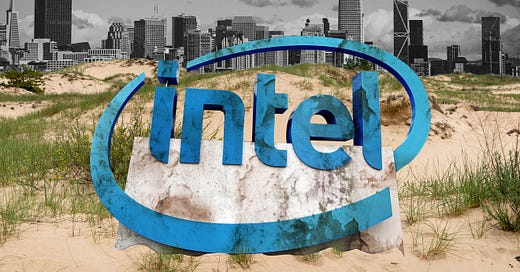Hot off the presses, we have confirmation from multiple employees that Intel is cutting costs tremendously at the expense of their employees. These cuts are broad-based, with employees having their compensation affected. Quarterly pay bonuses are gone, annual bonuses are being paused, 401k match is halved from 5% to 2.5%, merit-based raises are suspended, even patent filing rewards are cut down, and there is a pay cut to all employees’ base salary based on grade.
All employees below Principal Engineer, grades 7 to 11, will get a 5% cut, 10% cuts will be instituted for VPs, and the executive leadership team will take a 15% cut, with Pat Gelsinger taking a 25% cut. These cuts hurt even more when we are in an inflationary environment. These cost cuts are, of course, dwarfed by their quarterly dividend, which we have been clamoring for them to cut for over a year.
Intel’s leadership has decided that the dividend is more important than employee retention, which is bad news for the long-term future of the company.
We are sorry to all employees of Intel about this and hope they can make it through this tough time. Other firms are still hiring despite the macroeconomic conditions, although at a slower pace than before. This was an incredibly dumb move, as employees will become “quiet quitters” and lose morale. Bonus cuts are 1 thing, but base pay cuts sting. Intel, unfortunately, has to cut costs dramatically due to its immense amount of cash being burned, but they are doing it in the worst way.
High performers likely start to “phone it in” while they look for their next job, as there is no incentive to keep working long nights and early mornings. The level 7 cut-off point is too low. This includes some fresh advanced graduates and many normal graduates with a handful of years of experience.
In October, we discussed the comprehensive supply chain review that Intel was instituting to cut costs. Since then, Intel has cut an R&D center in Israel, started laying off thousands, cut their RISC-V accelerator program, ended development of networking switches, delayed construction on the Germany Fab, slowed Ohio fab tool orders, and cut capital expenditures by billions.
We will leave you with our rant from July of 2022 after Intel cut fab buildout by $4B to keep the dividend.
We were wrong about Pat Gelsinger and his mission for Intel. In the past we wrote how he changed Intel’s strategy and is “Betting The Farm” by investing heavily in their core business.
“Intel could follow the path of many other American goliaths such as IBM and General Electric. A slow slide to irrelevancy, spinning off business, and bringing shame to what was once pride for American ingenuity. Instead of that conservative route, they are going to bet the farm, spend every dime they make on investing in more manufacturing, design, and in general catching up in technology.”
We even believed that Pat Gelsinger was changing the culture that Intel has and was throwing everything including the kitchen sink at restoring Intel to their former standing. We want to apologize to as we were wrong.
This action shows Pat Gelsinger is very similar to the prior Intel CEO who was a career Chief Financial Officer at multiple publicly traded companies. It’s a disgrace that Intel has decided to cut fab buildouts while begging the US government for subsidies through the chips act and committing to growing their dividend.
This attitude by American executives is exactly why the US will lose in the semiconductor industry. Moves like the CHIPS Act are only band-aids to the problem and do not structurally change the policy issues in the US. We will do doing an objective deep dive on the 1,054 page CHIPS Act that recently passed, but it doesn’t even prevent Intel from continuing their plans of purchasing semiconductor manufacturing tools from a new Chinese supplier.
Intel’s financial model seems ignorant of what is happening in the macro economy and with their competition. Our financial model shows Intel will be free cashflow negative in 2023.
Even with billions in subsidies from the US and EU CHIPS Act’s, Intel faces a difficult choice due to deteriorating financials.




